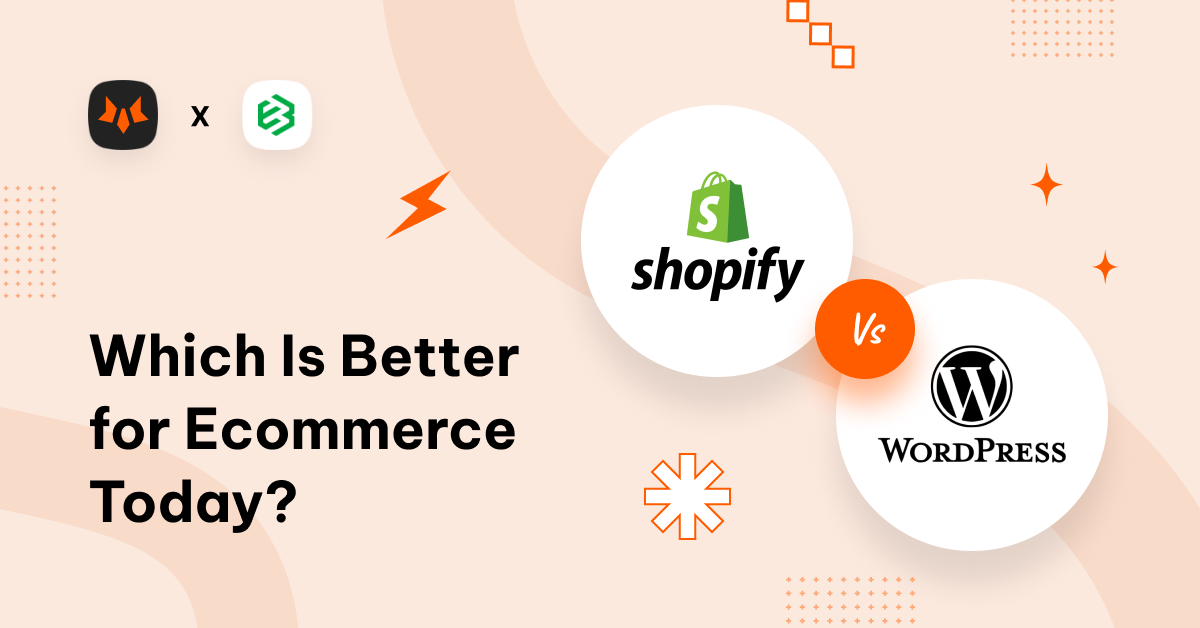Online shopping is preferred over the conventional way of shopping due to recent technological advancements and eCommerce stores. The introduction and expansion of eCommerce has changed many industries, and it will continue to do so. According to independent research, there are more than 12 million eCommerce websites operating around the world, and this channel itself is going to generate $5.42 trillion in sales for different businesses.
If you have a business that has customers at its center, having an online presence is highly needed. Research shows that 95% of all shopping will happen online by 2040, and if you want to grow, tapping into the eCommerce markets is essential.
While there are many storefronts and frameworks to develop eCommerce apps, Shopify and WordPress are still the leaders. But when it comes to building a store, you cannot use both of them, and you may have to narrow down on any eCommerce store builder. There are huge differences between Shopify and WordPress as they differ greatly in many significant ways. So this article is all about deep diving into Shopify and WordPress and understanding which of them is better for your needs.
Let's start with Shopify first.
What is Shopify?
Shopify is a SaaS solution that can be used by business owners to build, manage, and operate their online storefronts and eCommerce businesses. It is a niche product that focuses solely on eCommerce merchants, and it provides almost all the features that are required to run an eCommerce store successfully.
Being a cloud-based service provider, it has acquired a client base of 1.75 million sellers across the globe with a good mix of small and medium-sized businesses as well as large brands. Let’s find out some of the features of Shopify that make it an exciting option for eCommerce businesses.

Where Shopify triumphs
Shopify POS
Every online business needs a way to accept payments for their sales, and when you use Shopify, it is very easy. Without Shopify, you’ll have to spend time and money building payment gateway integrations for your eCommerce apps, and they come with lots of issues. Whenever there is any change in the payment gateway, your code’s chance of breaking becomes high.
To protect business owners from all the payment-related hassles, Shopify has introduced its own Point of Sale application. It helps stores to sell products and accept payments with ease. Moreover, the Shopify POS can be used in-store as well as on your online store that is powered by Shopify.
This POS application is compatible with Apple devices that can be used in-store, and it allows users to view their orders, customize them, or checkout at the store's counter. At the same time, the online version is usable by every customer who accesses your store.
Store Management
Shopify offers robust store management features using which you can handle items on your store, and run promotional offers, or do basic management like adding/removing items, changing some layouts etc. The store management feature also provides a default option to create customer profiles so shoppers can create their profiles on the store to access wishlist, cart, and other promotional features.
Shopify’s store management feature also helps you in keeping an accurate eye on the inventory by automatically handling sales and returns on a product in your catalog.
Built-in SEO
Search Engine Optimization helps businesses grow organically without spending a lot on marketing their products. This approach is all about tweaking various aspects of your eCommerce stores in a way that they rank higher on the search queries.
Shopify comes with great support to integrate third-party SEO tools into your website. These tools are available in the Shopify app store, and you can install them pretty easily. SEO apps can provide automatic metadata input to crawlers, multi-language support, and many other things that help in ranking your pages higher. Once your pages start ranking higher, they can generate more visibility and revenue for your business. Apart from these features, plugins like Booster image, and SEO optimizer can also be used to make the website rank higher.
Analytics
To grow eCommerce stores, lots of business owners deep dive into store analytics and understand their target audience better. If you don't have an in-built analytics module in your store, you may miss out on lots of important data. Shopify developers understood that very early on, and today, Shopify provides a powerful analytics module for each store.
The analytics module acts as a dashboard that provides metrics like sales, visitor demography, audience segmentation, product analytics, inventory analytics, and many different metrics under these umbrellas. Overall, it provides insights into all parts of your store, which is an essential feature in building a robust business.
Robust Security
Being a SaaS platform, Shopify is protected by the best security measures. Whenever you open your Shopify store, you get your own 256-bit SSL certificate that keeps your site secure, and users can trust your website for payments and any data-related exchanges. Moreover, it is also PCI-DSS compliant so all credit card and debit card payments can be securely carried out on the platform. Apart from this, all the data on your website is stored in an encrypted format, so there is no way that a data leak can expose any credentials or crucial information.
What is WordPress?
WordPress is a popular CMS (Content Management System) that comes as one of the robust Shopify competitors. It empowers you to build and operate your own website or blog. As a matter of fact, WordPress powers almost 43.2% of all websites on the web. Since it was launched, the platform has evolved into a massive tech product, and today, it offers a variety of things, where eCommerce is one of its possibilities.

WordPress offers self-hosted and Hosted WordPress offerings. As the name suggests, in the self-hosted option, you have to host and manage your own WordPress website along with the underlying infrastructure. On the other hand, hosted WordPress is a SaaS solution similar to Shopify. Let’s have a look at some of WordPress’s features.
Where WordPress triumphs
eCommerce Plugins
With WordPress, you can build anything that you want with the help of plugins, and eCommerce stores are no different. There are various free and paid as well as open-source plugins in the WordPress domain that can be used to create awesome eCommerce stores. When it comes between these two giants, WordPress surely wins as it has more diverse plugins than WordPress, and being an open-source project, it will continue to get more plugins from the community.
Payment Gateway Integrations
When you build WordPress eCommerce stores, you can have your own payment gateway integration. There are various payment processors like Stripe and Apple Pay, and you can integrate them as per your needs.
Filtering and Search
WordPress websites provide awesome filtering and search functionalities. When building a great eCommerce store, filtering and search options are quite important. Implementing them is easier in WordPress, and you can keep improving the features as and when you add new things to your website.
Having known about both these storefront building technologies, let’s compare them in the next section.
Comparing Shopify vs WordPress for eCommerce
Web Hosting
Web hosting is needed to make your website online. You may build a great store, but it will not provide good business if your web hosting is unreliable and laggy. Good web hosting helps in building websites that are available around the clock, scalable, and load fast. Shopify is a SaaS solution, so it provides its own hosting, and you don’t have to worry about web hosting for your new eCommerce store. As the company itself provides dedicated hosting for eCommerce stores, it is much better optimized and reliable.
On the other hand, WordPress provides self-hosted as well as hosted services for your eCommerce store. While on-premises might be good sometimes, expenses are much less when you get rid of hosting problems at your end. Based on your bandwidth and financial conditions, you may choose Shopify if you can spend a bit more and enjoy freedom from configurations, etc.
Storefront Design and Templates
A unique store design often brings in a lot of traffic. So, when you are building a new eCommerce store, you should think of the design and template availability. Shopify has a wide list of themes that are available for developing your stores. There are 140 designs in Shopify, and you can choose to build with any template just after installation.
Coming to WordPress, it has thousands of free and open source, as well as paid themes that are available to build awesome eCommerce stores. Moreover, the customization options with WordPress are endless, and you can create a completely unique store.
WordPress will give you more freedom than Shopify if you want to build a store by pouring all your creativity.
eCommerce Functionality
At the end of the day, you are making the website for an eCommerce store, and it should offer as many functionalities as possible. Shopify is solely made to cater to eCommerce businesses, and it has many more features than WordPress. With Shopify, you can connect your offline stores and online stores in one place and have better control of your business.
Shopify provides more features for eCommerce, and it will continue to do so. If your aim is to have more features in your store, you should definitely choose Shopify.
Wordpress vs Shopify: which is best for your business?
Coming to an end, we have discussed the various features of both Shopify and WordPress for eCommerce stores. Moreover, the head-to-head comparison also shows that Shopify is a better choice if you want an eCommerce-focused app. There are many significant differences between Shopify and WordPress. Building a successful product development strategy for their eCommerce website is very essential for business owners. But before you think of going ahead with anyone, understand your needs and reevaluate both these offerings to make an informed decision.
Last but not least, stay tuned to our eCommerce Blog and read the latest industry news. Happy selling!






